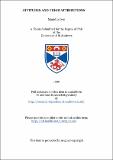Files in this item
Attitudes and their attributions
Item metadata
| dc.contributor.advisor | Wright, Crispin | |
| dc.contributor.advisor | Hale, Bob | |
| dc.contributor.author | Sen, Manidipa | |
| dc.coverage.spatial | 161 p. | en_US |
| dc.date.accessioned | 2018-06-28T09:36:04Z | |
| dc.date.available | 2018-06-28T09:36:04Z | |
| dc.date.issued | 1996-07 | |
| dc.identifier.uri | https://hdl.handle.net/10023/14692 | |
| dc.description.abstract | This doctoral dissertation is on the semantics of propositional attitude ascriptions. To be more precise, it is mainly concerned with various kinds of analyses of singular propositional attitude ascriptions. These are sentences of the general form 'X Øs that a is F', where 'X' can be replaced by the name of the person who is in the particular mental state, 'Ø' can be replaced by a propositional attitude verb, like 'believe', 'doubt', 'hope', 'desire', etc., 'a' can be replaced by the name of the individual/object about whom/which the particular attitude is held, and 'F' can be replaced by the name of the property that the individual/object is said to have. The dissertation takes belief to be a paradigmatic example of a propositional attitude, and, thus, focuses mainly on the semantics of ascriptions of beliefs. The thesis it defends is that while a correct analysis of belief ascriptions in general involves a relation between the believer and the proposition which is believed (and which can be regarded as the reference of the 'that'-clause of the belief report), a semantic distinction still needs to be made between de re and de dicto beliefs. This distinction can be made by distinguishing between two different kinds of propositions -- Russellian propositions corresponding to de re beliefs, and Fregean propositions corresponding to de dicto beliefs. This approach is motivated by arguing that the recent proposals of the 'hybrid' type concerning the semantics of belief reports, advocated by such philosophers as Schiffer, Crimmins, Richard, etc., fail. These proposals fail because of overgeneralisation, and, therefore, fail to capture the de re/de dicto distinction. Therefore, if the de re/de dicto distinction is genuine, and the propositions occurring within these two kinds of reports are essentially different, then a single account of belief ascriptions cannot be given. We need two different semantical accounts to capture the distinction. A de re report is best understood by a semantics of the broadly Russellian variety, while a de dicto belief report is best understood by a semantics of the Fregean variety. | en_US |
| dc.language.iso | en | en_US |
| dc.publisher | University of St Andrews | |
| dc.subject.lcc | B840.A8S4 | |
| dc.subject.lcsh | Semantics | en |
| dc.title | Attitudes and their attributions | en_US |
| dc.type | Thesis | en_US |
| dc.contributor.sponsor | Commonwealth Scholarship Commission in the United Kingdom | en_US |
| dc.contributor.sponsor | British Federation of Women Graduates | en_US |
| dc.type.qualificationlevel | Doctoral | en_US |
| dc.type.qualificationname | PhD Doctor of Philosophy | en_US |
| dc.publisher.institution | The University of St Andrews | en_US |
This item appears in the following Collection(s)
Items in the St Andrews Research Repository are protected by copyright, with all rights reserved, unless otherwise indicated.

